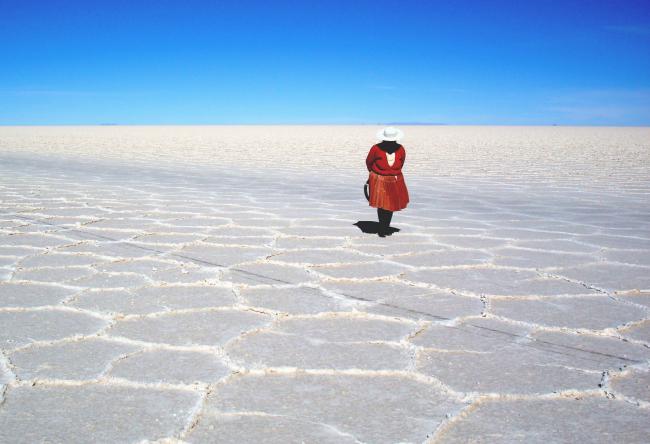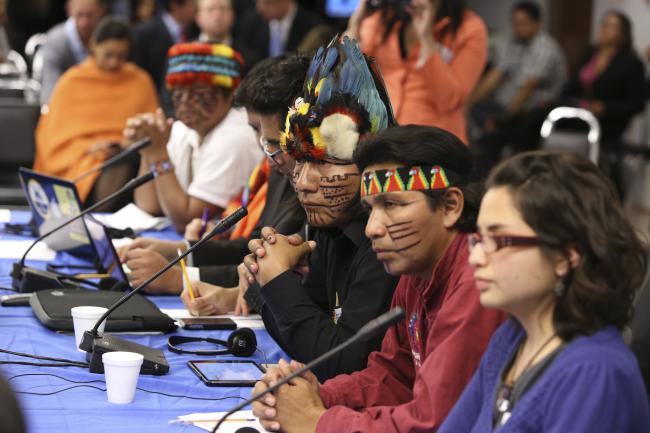
Bolivia’s high growth rates have sparked cheers from groups as divergent as the IMF and the Venezuelan government. Left-leaning observers have downplayed Ecuador’s increasingly anti-environmentalist stance by pointing to the country’s redistributive policies. Global capitalists—from oil and gas company Repsol’s CEO to China’s variants thereof—have flocked without flinching to embrace the leaders of all of Latin America’s resource-rich countries, regardless of their putative politics. And despite the current drop in oil prices—which may lead some to briefly turn a more critical gaze toward Latin America’s current iteration of oil dependency—observers from both the right and left have tended to celebrate the boom. Uniting the traditionally politically opposed, extractivism today shapes a new hegemonic order—one that is sutured to global capitalism.
Across Latin America, governments on the left began joining those on the right in the late 1990’s to promote policies that accelerate extractivism in its various forms. In mining this has meant weakening regulatory, democratic, or environmental protection mechanisms to expand concessions or criminalize protest, as has been seen in Colombia and Peru. In oil and gas this has meant passing legislation specifically aimed at expanding extraction into “unconventional” terrain by giving favorable terms to foreign private investment in specific areas, such as Mexico’s offshore oil fields, Brazil’s pre-salt reserves, Argentina’s shale, and Bolivia’s gas fields. And, in agroindustrial expansion for fuel crops, we see policies aimed at propping up transnational soy and sugar companies, most notably in Bolivia, Brazil, and Paraguay.
On the right there is not much contention over the extractivist agenda, but more of a question of how much and how fast. The recent actions of Mexican and Peruvian officials—privatization in the former, the dismantling of environmental oversight in the latter—demonstrate the uncritical nature of the race to remove regulatory barriers.
The debate on the left, however, has been both impassioned and bifurcated, generally split between those countries pursuing extractivism with a semblance of more redistributive policies (Bolivia, Ecuador, Brazil, and Venezuela) from those countries hewing close to the neoliberal line (most of the rest of the region). Extractive economies in the former are usually referred to as new, progressive, social, or even socialist. Through a kind of cost-benefit analysis, observers on the left have argued in defense of this “new” extractivism—and sometimes quite surprisingly, some of these governments’ less than progressive policies—by highlighting the restoration of sovereignty, the exercise of more control (and internalization) of capital flows, and redistributive, anti-poverty, and public investment policies. To be sure, all of these countries have seen decreased poverty rates—much of it tied to government transfer programs—and increased investment in public infrastructure, education, and healthcare. Those on the left who tend to question extractivism’s less progressive effects run the risk of being labeled imperialists, hypocritical Northern environmentalists, or as Ecuador’s President Rafael Correa termed anti-mining activists, “infantile [children],” “nobodies,” or “allies of the right.”
This cost-benefit analysis of dependency vs. redistribution—curiously enough, a neoliberal mode of thinking—tends to downplay what might be the deeper stakes of support for social(ist) extractivism: the hegemonic struggle around a resurgent U.S. power in the region. Bolivia, Ecuador, and Venezuela—alongside a sometimes ambivalent Brazil—represent a counterweight to United States hegemony. Mexico, Central America, Colombia, and Peru—with an equally ambivalent Chile—represent the front-line of U.S. interests in free trade, Pacific area influence, and ideological consensus. Those who challenge the agendas of the small extractivists like Bolivia and Ecuador are thus accused of working to chip away at the last bastion of opposition to American imperialism. According to this line of thought, a geopolitical calculus in support of anti-imperialist governments requires one to turn a blind eye to extractivism and the discontents it produces.
As with all debates, this one appears tethered to its poles. So we ask, what might this debate be obscuring? What is really shaping the conversation about present realities and future alternatives?
We might begin to answer these questions by learning from some of the infantile nobodies on the left who dare critique the supposed social gains of the extractive turn. On the ecological left—the target of both right-wing scorn and conventional left-wing suspicion—are a combination of grassroots social movements, prominent intellectuals, and NGOs. Most have taken a critical view of what Maristella Svampa refers to as the “commodities consensus,” the hegemonic vision that has replaced the market-centered Washington Consensus of the 1990s and which flattens any significant distinction between so-called right- and left-leaning governments. Along with figures like Alberto Acosta from Ecuador and Eduardo Gudynas of Uruguay, these voices have been working to simultaneously critique extractivism and imagine new alternatives for the future.
These are not merely ideological musings. Social movements and communities on the ground confront the often-violent impacts of extractivism. Extractivism generates relatively little employment, most of it for men, with all of the layers of gendered dependency that follow for women. As a set of industries, extractivism depends on ever-expanding frontiers, thus embodying colonial modalities of territorial expansion and destructive attitudes toward nature. This means that rural communities and indigenous peoples are seen as obstacles to the national “need” for more exploration. As dependence on extracted commodities increases, governments whittle away at citizen rights. The promise of compensation or rents, if anything usually circulated through male-dominated institutional circuits, is invariably small given deeper disruptions and social violence to land and livelihoods. The positive sentiment generated by increased urban consumption tends to ignore or obscure these rural dislocations.

Indigenous organizations impacted by mining in the Andes, in particular, have invoked the Pachamama (roughly, “the mother of time and space”) to suggest a spiritual foundation for opposition to extraction. According to world views associated with the Pachamama, what western thought often calls “nature” is in fact a world of sentient entities and forces with which humans maintain a precarious social relationship. Extractivism in its capitalist expression is a form of violence wrought by humans, and will be met with global warming, drying springs, and decreasing rains. By this logic, the Pachamama will repay human greed with existential pain. Often embraced by academics in Latin America and the United States as much as by those directly affected by extraction projects, this pachamamismo converges with positions that argue against the Eurocentric and western idea of development and for a reconfiguration of human-nature relations. While these ideas are deeply held in much of Latin America, they have been parodied by extractivists, left and right, as folkloric incantations that lack a realist perspective on hard truths. The Pachamamista response? That drying lands, disrupted flowering seasons, melting glaciers, and streams that no longer flow reveal Pachamama’s own hard truths, rendering somewhat hollow the claims that extractivism is good for the national economy.
What these positions suggest is a political field that pits the right-wing status quo against a left united by a broadly anti-capitalist orientation yet divided by new struggles over ends and means. Within this field, short-term impacts on poverty carry significant weight. As the left-extractivists point out, many local communities and organizations support extractive activities because of opportunities for job creation, redistributive transfers, or the hope of compensation. But as critics argue, short-term gains weaken spaces of mobilization and critical thought needed to address long-term livelihood. Indeed, 20 years from now, when the gas in the Bolivian Chaco is exhausted, will peoples like the Guaraní and their neighbors be living any better or worse than they are now? What will the economy look like then? Will the water be clean? Will there be water at all?
These questions force us to consider the need for more complex projections into the future. First, we need to produce clearer analyses of the political-economic transformations spurred by extractivism—both within countries and in new and emerging international relations. On the domestic front, the erosion of democratic accountability in places like Colombia and Guatemala has sparked novel attempts to promote local autonomy—or at least, some real popular input into the shaping of extractive activities—through marches, mobilizations, and the new strategy of the community referendum. And new modes of grassroots struggle have emerged elsewhere, as in Ecuador, as the country’s indigenous organization CONAIE becomes further embroiled in a bitter confrontation with the Correa government over the centralization of political power. For Correa and the extractivist left, the government might be justified because of its redistributive or anti-imperialist legitimacy. From a more critical left, we might ask whether and how weakening social movements and concentrating power—a la China perhaps—will contribute to a more progressive society. Might it be that a government of the left is attempting to return the situation of indigenous rights to its pre-neoliberal state? Are arguments for and against extractivism generating or undermining deeper thinking about ongoing forms of colonial racism and racialized exclusion?
On the level of global transformation, the internecine arguments on the left have failed to accurately dissect the changing patterns of production, trade, and consumption at work. Extractive regimes, for example, continue to reshape and redirect capital flows on a global scale. Close to home, Bolivia’s gas largely goes to fuel industrial development and capital accumulation in the São Paulo core of the Brazilian economy. And a bit farther afield there is China, which has gone from being a relatively insignificant economic player in Latin American markets to the region’s fastest growing trading partner, in many cases unseating the United States in its own backyard. As a whole, Latin American exports to China have risen dramatically since 2000, averaging a 23% annual export growth rate. Over 50% of Latin American exports to China are in three critical commodities: copper, iron, and soy. An understanding of new transnational articulations of power and capital seems critical to our analyses of extractivism—and our ability to revision the future.
The question of temporality is also crucial. As Don Fitz, editor of Green Social Thought, points out, the extractivist left and right is conjoined by a short-term vision. What might a longer-term mapping of the social and economic consequences of extractivism reveal? Look, for instance, at water. Water looms through every dimension of extractivism—it is pumped into oil and gas wells for drilling and spewed out in contaminated ponds. And fracking, now set to unfold across the driest ecosystems in Bolivia and Argentina, uses even more. If those on the right suggest that the market will sort out who gets water and for what purposes, how do the extractivists on the left analyze and sort out who drinks and who does not?

We should also think about economic production. Certainly, the governments of the so-called “pink tide” have made significant strides in dismantling neoliberal orthodoxies about redistribution. Cash transfers to poor families, expectant mothers, schoolchildren, and retirees are unquestionably significant short-term measures to address poverty. Likewise, government investment in urban infrastructure, education, and health care should be celebrated, from Bolivia to Ecuador to Venezuela. We do not question these gains. Should we thus uncritically turn a blind eye to the assault on nature and rights upon which extractivism depends? Does this then mean we should embrace agroindustrial systems that, in the same vein as extractive regimes, continue to push rural smallholders into urban zones of marginality, to become under- or unemployed? Is it possible to think more creatively and critically about how lands and natural resources might be approached for longer-term sovereignty and sustainability?
Here again, the pro-and-anti debate obscures and ignores the creativity of movements in Latin America that are reimagining regional economies, working toward turning lands and resources into sustainable systems. For instance, the Via Campesina (global peasant organization) and the Landless Peasant Movement (MST-Brazil) have militantly resisted expansion of biofuel soy and sugar crops, arguing that it leads to further environmental degradation and displacement of small-scale farmers. The MST model is perhaps the most advanced in imagining an alternative socio-economic and political order through worker-led, worker-run farming cooperatives that sell products to urbanites. MST communities in Brazil are beginning to think about wind-powered settlements, training young people across Latin America in agro-ecology, and alternative forms of medicine. Are these models ones we can imagine spreading from region to region? Can movements push progressive states further left to make room for a different kind of social economy?
In an era in which both nature and society are challenged by the consumptive fever unleashed by this extractivist consensus—with low gasoline prices in the United States simply its latest blinding manifestation—time is crucial. Progressive social and political transformation in Latin America cannot thrive on export-dependent extractivism. Unfortunately, the hard truths of the Pachamama, the realities of climate change, and the impacts on landscapes and livelihoods may outpace the capacity for critical and creative thought. What is certain is that the dismissal of the critique of extractivism by many on the left is, somewhat like much of the earth itself, nearing a point of exhaustion.
Nicole Fabricant teaches anthropology at Towson University, and is the author of Mobilizing Bolivia’s Displaced: Indigenous Politics and the Struggle over Land (UNC Press). Bret Gustafson teaches anthropology at Washington University in St. Louis, and is the author of New Languages of the State: Indigenous Resurgence and the Politics of Knowledge in Bolivia (Duke University Press). They also have a co-edited the book Remapping Bolivia: Resources, Indigeneity and Territory in a Plurinational State (SAR Press, 2011).
Read the rest of NACLA's 2015 Winter Issue: Mapping the Moment

